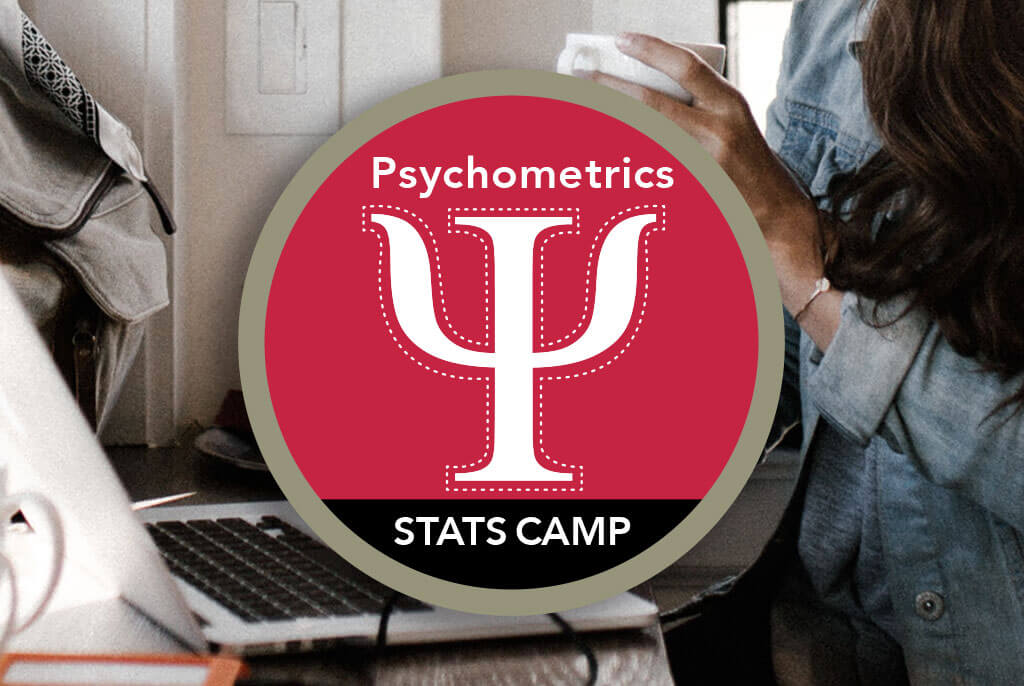This course is currently in session. If you register now you will get instant access to the remainder of the livestream online discussion. The links to watch the asynchronous video will be provided on February 21st.
LIVE STREAM – 4-day Statistics Short Course
Seminar Overview:
An introductory 4-day course in the application of psychometrics. Participants should be proficient specific to the material covered in a two-semester graduate-level social science statistics course sequence.
Seminar Topics:
- Measurement and statistical concepts specific to psychometrics
- Scaling, scaling models & scale development – stimulus, response and subject centered
- Validity – conceptual and statistical aspects necessary for evidential arguments
- Introduction to Factor analysis – traditional, IRT and SEM-based approaches/connections
- Reliability – classical and modern approaches to estimation of score reliability
- Introduction to Item Response Theory
Seminar Description:
Psychometrics is defined as the science of evaluating the characteristics of tests or other devices designed to measure psychological attributes of people. Tests are broadly defined as devices for measuring ability, aptitude, achievement, attitudes, interests, personality, cognitive functioning, and mental health. Application of psychometrics to psychology and social/behavioral science constitutes an organized effort to (a) properly use theory-based measurement procedures for the development of tests and other measurement instruments for inter- and intraindividual research designs and (b) incorporate current best practices for applying measurement theory, item/scale development, reliability estimation (classical and modern), factor analysis/IRT and establishing statistical evidence of score validity through a unified approach. advance knowledge in psychological and sensory processes. Participants will receive an electronic copy of all course materials, including lecture slides, practice datasets, software scripts, relevant supporting documentation, and recommended readings. Participants will also have access to a video recording of the course.
Instructor: Larry Price, Ph.D.
Larry Price, Ph.d. is a Professor of Psychometrics & Statistics and Director of the Office of Data Analytics & Methodology at Texas State University. Between 1999 and 2002, Dr. Price was employed at The Psychological Corporation in San Antonio as a Senior … Psychometrician/Statistician where his work focused on improving the psychometric properties of the Wechsler Scales of Intelligence Memory (e.g., WISC-III, WISC-IV, WAIS-III, WMS-III, and WPPSI-III), and Achievement (WIAT-II) and other psychological measures such as the Beck Depression Inventory (BDI) and Clinical Evaluation of Language Fundamentals (CELF-IV). His research interest includes the theoretical development and testing of Bayesian and non-Bayesian psychometric models in psychological and neuropsychological research (neuroimaging network analysis), theoretical development, testing, and refinement of classical and modern psychometric methods in the behavioral sciences, development of dynamic multivariate time series models for the psychological, social and neurosciences. Prior to working at Psychological Corporation, he worked at Emory University from 1986 to 1999 as a Biostatistician and Psychometrician in the School of Medicine. Funding mechanisms for Dr. Price’s work include NIH, NSF, DOE, and private organizations.
APA Continuing Education Credits:
This course provides 22 credit hours for continuing education. Stats Camp Foundation is approved by the American Psychological Association to sponsor continuing education for psychologists. Stats Camp Foundation maintains responsibility for this program and its content.
Seminar Includes:
Materials, downloads, recorded course video viewable for up to one year.




